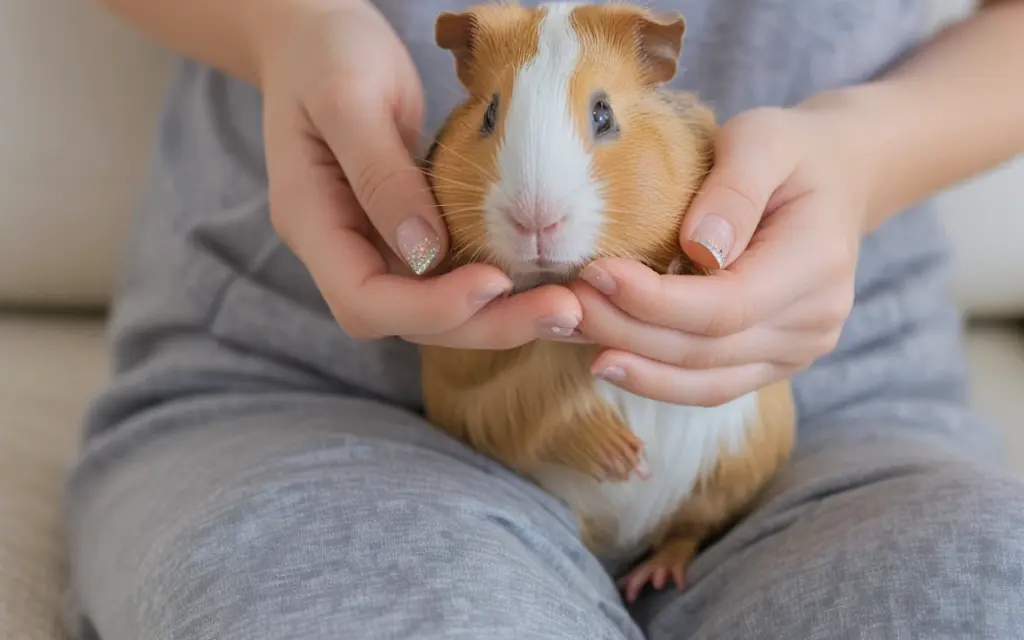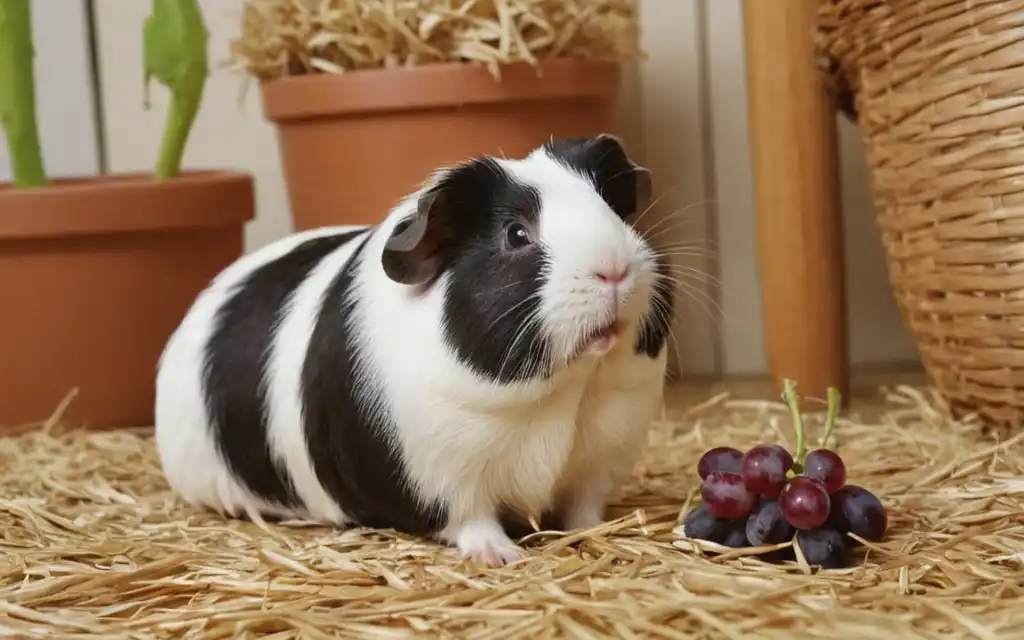Pictures of guinea pigs enjoying the outdoors can make most pet owners feel like letting their tiny rodents live a natural life outside. However, before moving your furry companion outside, you need to find the right answer to the question “Can guinea pigs live outside”?
Even though you can move their cage to your backyard sometimes but, you should remember that outdoor living comes with risks. The little furballs may have to face different challenging situations like loneliness, predators, and extreme weather when kept outdoors.
So, here is everything you need to know to create a safe outdoor setup before moving them outside.
Are guinea pigs built for the outdoors?
Guinea pigs are domestic animals descended from species found in the Andes Mountains. Today, guinea pigs rely on humans for a safe livelihood, but their ancestors roamed in rugged terrain decades ago.

Here are some causes that make outdoor living somewhat difficult for guinea pigs.
Social in nature
Guinea pigs are social animals and thus need companionship to stay happy. Moving a guinea pig outside alone can cause stress.
Sensitive to temperature
These tiny rodents prefer to stay at 65 to 75 degrees Fahrenheit (18 to 24 degrees Celsius). So, if it is too hot or too cold outside, these animals can get sick more often.
Prey instincts
They can be easily targeted by cats, big rats, and birds due to their small size.
What temperature is best for guinea pigs to live in?
As mentioned above, temperatures between 18 to 24 degrees Celsius are ideal for your guinea pig. Extremely cold temperatures (i.e. below 15 degrees Celsius) can make your furry pet get chilled. Your piggy could get a heatstroke if the temperature gets hotter than 26 degrees Celsius.
Their blood flow to the skin increases to cool them down if they are hot. Furthermore, the blood flow to the skin reduces to conserve heat when it is cold. These animals do not have sweat glands, so they cannot sweat even if it is too hot. Thus, you need to ensure your little pig does not get too hot or cold.
What are the pros and cons of living outside?
Outdoor living can have some benefits and risks. Here are some of them.
| Pros | Cons |
|---|---|
| Living outside can help your guinea pigs get natural sunlight to boost their health. | Placing your guinea pigs outdoors leads to less interaction and neglected care. |
| Keeping them in large open spaces allows more exercise and fresh air. | When these tiny rodents are moved outdoors, their lives can be stimulated with new sounds, textures (like grass), and new smells. |
| when these tiny rodents are moved outdoors,s their lives can be stimulated with new sounds, textures (like grass), and new smells. | Even if your pet is kept in secure cages, it can be attacked by raccoons, dogs, or other predators. |
What are the ideal outdoor conditions for guinea pigs?
Here’s a proper setup you need to make before moving your guinea pigs outdoors.
The location should be safe
Always place the hutch away from direct sunlight or wind when moving your furry friend outside. Keep them in a quiet and elevated area to avoid stress and flooding.
Controlled temperature
Guinea pigs cannot survive in extreme temperature conditions as they are like tiny thermostats. So, during the summer, provide these tiny pets with frozen water bottles, shade, and ceramic tiles to help them cool down when placed outdoors. During winter, use hay piles, heat-safe pads, and insulated hutches if the temperature falls below 60°F.
Make a predator-proof house
Metal cages with lockable latches are necessary to keep your pet safe and away from predators. To protect your guinea pigs from digging predators, always make raised flooring. Roof coverage can keep out rain/snow and birds of prey.
Ways to set up a perfect outdoor guinea pig habitat

Before planning to build a pig paradise, follow the tips shared below.
The right enclosure is necessary
A wooden hutch can be the best option for your little piggy. The hutch should be spacious at least 7.5 square feet per pig. Wire mesh ventilation and a waterproof roof can add extra safety and comfort.
Cleaning and bedding
Cleaning the cage regularly can prevent the dampness that attracts mold and flies. Hay or fleece bedding is ideal as they are absorbent.
Food and water stations
Provide your little rodents with sufficient fresh veggies, vitamin C-rich pellets, and a large amount of hay. Use heavy ceramic bowls to prevent tipping inside the cage. Water bottles should be checked twice a day as the water can overheat or freeze depending on the temperature outside.
Playful essentials
You can add chew toys, hideouts, and tunnels inside the hutch. To prevent your furry companion from getting bored.
Seasonal care
Changes in weather conditions determine the way to care for the guinea pigs. Here’s how to take proper seasonal care.
Survival tips (summer)
Keeping your tiny piggy outside during warm summer days can be challenging. Excessive heat may cause heatstroke. So, if you notice any symptoms such as lethargy or heavy panting, bring your piggy inside immediately. Always place the hutch away from direct sunlight during the hottest part of the day.
You should also provide the little furballs with freeze-dipped water bottles wrapped in towels for cooling stations. To keep the tiny animal refreshed and hydrated, you can offer cucumber slices.
Preparation strategies (winter)
A guinea pig cannot survive outdoors if the temperature drops below 60 degrees. In this situation, moving them inside is the only option.
You can use straw bales or thermal covers to insulate the hutch and keep it warm. Never use heaters inside the hutch, as they are a fire risk. You can pile extra hay to help the tiny rodents for burrowing. Exposure to wind, rain, and cold may increase the risk of hypothermia.
What can be an alternative to full-time outdoor living?
If you are not confident enough about keeping your guinea pig outside the whole day, then try these compromises.
Try out Both outdoor/indoor setups
To let your tiny piggy stay outside during the day for outdoor adventures, you can use a portable playpen. It is better to keep them inside at night or during extreme weather conditions.
Supervision is important
You can take your beloved piggy outside along with you. Always stay nearby and let them graze in a secure run in your presence. Hawks can strike fast, so never let your furry friend go out of your reach.
Final verdict
Guinea pigs can stay outside only if you are ready to invest in time, vigilance, and money. Your guinea pigs may not be bothered about whether they are outside or inside until the place is safe and cozy. As guinea pigs are domestic animals, they enjoy living with their favorite humans.
However, if you want to move your guinea pig outdoors, then consider factors like temperature control, daily interaction, and predator-proofing. Bring them back inside immediately if the weather turns nasty. It’s up to you to ensure your piggy does not get too hot or cold.
After all, keeping this delicate pet happy and healthy should be your foremost concern and commitment.
